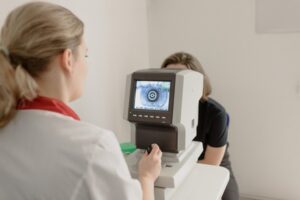In the world of optometry, the pursuit of better vision goes far beyond the traditional 20/20 measurement. Thanks to remarkable advancements in technology and innovative approaches, optometrists and researchers are pushing the boundaries of what’s possible in vision correction. From cutting-edge diagnostic tools to groundbreaking treatments, the field of optometry equipment is at the forefront of enhancing visual acuity and improving quality of life for millions of people worldwide.
Some of the advancements in optometry and vision correction:
- Precision Diagnostics: The key to effective vision correction starts with accurate and comprehensive diagnostics. Traditional eye exams have evolved significantly, with the integration of advanced imaging technologies such as optical coherence tomography (OCT) and corneal topography. These tools provide detailed 3D images of the eye, allowing optometrists to detect and diagnose conditions with greater precision, including glaucoma, macular degeneration, and corneal irregularities. Following companies are known for their precision diagnostics products.
-
- Carl Zeiss Meditec: Carl Zeiss Meditec is a leading provider of medical technology solutions, including advanced diagnostic equipment for ophthalmology and optometry. They offer OCT systems, such as the Cirrus and the Visante, which provide detailed imaging of the eye for enhanced diagnostics.
- Heidelberg Engineering: Heidelberg Engineering specializes in innovative diagnostic devices for eye care professionals. Their SPECTRALIS OCT combines high-resolution imaging with multimodal functionality, allowing for comprehensive diagnostics and monitoring of various eye conditions.
- Topcon Corporation: Topcon Corporation offers a range of diagnostic devices for eye care professionals, including OCT systems like the Topcon 3D OCT-1 Maestro. Their advanced imaging technology assists in the detection and management of ocular diseases.
- Nidek: Nidek: Their OCT systems, such as the RS-3000 and the RS-6000, provide high-resolution imaging for precise diagnostics and monitoring of eye conditions.
- Optovue: Optovue: Their OCT systems, such as the Avanti and the AngioVue, offer advanced imaging capabilities for comprehensive diagnostics, including retinal and anterior segment imaging.
 Customized Vision Solutions: One of the most significant advancements in vision correction is the shift toward personalized treatments. While eyeglasses and contact lenses have long been the go-to options, today’s optometry offers tailored solutions like never before. Customized contact lenses, for instance, can correct not only common refractive errors but also higher-order aberrations, addressing specific visual needs and improving overall vision quality. Companies that offer customized contact lenses are mentioned below:
Customized Vision Solutions: One of the most significant advancements in vision correction is the shift toward personalized treatments. While eyeglasses and contact lenses have long been the go-to options, today’s optometry offers tailored solutions like never before. Customized contact lenses, for instance, can correct not only common refractive errors but also higher-order aberrations, addressing specific visual needs and improving overall vision quality. Companies that offer customized contact lenses are mentioned below:
-
- Johnson & Johnson Vision offers customized contact lenses, such as ACUVUE OASYS® with Transitions® Light Intelligent Technology™, which adapt to changing light conditions and provide personalized vision correction.
- Bausch + Lomb offers a range of vision correction products. Their custom contact lens options, such as the Bausch + Lomb Ultra® for Astigmatism and the Biotrue® ONEday lenses, provide personalized solutions for various refractive errors.
- CooperVision offers customized lenses like the CooperVision Biofinity® XR, which can address higher-order aberrations and provide personalized vision correction for individuals with specific visual needs.
- Essilor offers personalized lenses, including the Varilux® X series for presbyopia, which are customized to each individual’s unique visual requirements and provide enhanced visual clarity across all distances.
- SynergEyes specializes in hybrid contact lenses that combine the comfort of soft lenses with the visual clarity of rigid gas-permeable lenses. Their lenses, such as the Duette® hybrid lenses, are customized for individuals with astigmatism and other vision correction needs.
 Laser Vision Correction: A Quantum Leap Laser vision correction techniques, such as LASIK (Laser-Assisted in Situ Keratomileusis) and PRK (Photorefractive Keratectomy), have revolutionized how we correct refractive errors. These procedures reshape the cornea to precisely adjust it’s focusing power, enabling individuals to reduce or eliminate the need for corrective lenses. With refined techniques and advanced femtosecond lasers, laser vision correction has become even more accurate, predictable, and safe, offering patients a life-changing alternative to glasses and contacts.
Laser Vision Correction: A Quantum Leap Laser vision correction techniques, such as LASIK (Laser-Assisted in Situ Keratomileusis) and PRK (Photorefractive Keratectomy), have revolutionized how we correct refractive errors. These procedures reshape the cornea to precisely adjust it’s focusing power, enabling individuals to reduce or eliminate the need for corrective lenses. With refined techniques and advanced femtosecond lasers, laser vision correction has become even more accurate, predictable, and safe, offering patients a life-changing alternative to glasses and contacts.
-
- LASIKPlus is a leading provider of laser vision correction services. They have multiple centers across the United States and offer advanced LASIK procedures using state-of-the-art laser technology.
- TLC Laser Eye Centers is a renowned provider of laser vision correction services. They offer a range of procedures, including LASIK and PRK, performed by experienced surgeons using advanced laser systems.
- The Laser Vision Institute is a dedicated center for laser vision correction. They offer personalized treatment plans for LASIK and PRK procedures, utilizing advanced laser technology for precise and effective vision correction.
- Shinagawa is a leading provider of LASIK and other laser vision correction procedures. They have clinics in several countries and are known for their expertise in refractive surgeries.
- Orthokeratology: Orthokeratology, also known as Ortho-K, is a non-surgical method that involves wearing special gas-permeable contact lenses overnight. These lenses gently reshape the cornea during sleep, temporarily correcting near-sightedness or astigmatism. The effect lasts throughout the day, providing clear vision without the need for glasses or contacts. Ortho-K is particularly beneficial for those who prefer not to undergo surgical procedures or for children whose vision is still changing.
-
- Paragon Vision Sciences is a leading manufacturer of orthokeratology lenses. They provide a range of Ortho-K lens designs, such as Paragon CRT® (Corneal Refractive Therapy), which are FDA-approved for overnight corneal reshaping.
- Euclid Systems Corporation specializes in orthokeratology lenses and services. They offer customized Ortho-K lens designs, including Euclid Emerald™ and Euclid MAX™, to correct refractive errors and provide clear vision during the day without the need for glasses or contact lenses.
- Menicon is a global company that offers a variety of vision care products, including orthokeratology lenses. Their Ortho-K lens options, such as Menicon Z Night™ and Menicon Z Alpha™, aim to correct myopia and astigmatism through overnight lens wear.
- CRT is a brand that focuses on overnight orthokeratology lenses. Their lenses are designed to gently reshape the cornea while sleeping, allowing for clear vision during the day without the need for glasses or daytime contact lenses.
- Artificial Intelligence: The integration of artificial intelligence (AI) in optometry is transforming the way eye conditions are diagnosed and managed. AI-powered algorithms can analyze retinal images, detect signs of diabetic retinopathy or age-related macular degeneration, and assist in early disease detection. Additionally, AI-driven platforms can monitor the progression of conditions and provide personalized treatment plans, optimizing patient care and outcomes.
-
- RetinaAI is a company that specializes in AI-powered retinal imaging analysis. Their platform utilizes advanced algorithms to detect and analyze various retinal conditions, including diabetic retinopathy and age-related macular degeneration.
- Eyenuk is a leader in AI-based eye care screening and monitoring solutions. Their EyeArt AI system uses deep learning algorithms to detect diabetic retinopathy and other eye diseases from retinal images, enabling early intervention and personalized treatment plans.
- DeepMind Health, a subsidiary of Google’s DeepMind, has been involved in AI research for various healthcare applications. Their work in ophthalmology includes developing AI algorithms to analyze retinal images and detect eye diseases with high accuracy.
- IBM Watson Health utilizes AI technology to assist in diagnosing and managing eye conditions. Their AI algorithms can analyze medical images, such as retinal scans, and provide insights to support optometrists in decision-making and treatment planning.
The world of optometry is experiencing a remarkable shift, driven by advancements that take us beyond the traditional limits of 20/20 vision. From precision diagnostics to personalized treatments, and from laser vision correction to innovative technologies like Ortho-K and AI integration, optometrists are changing lives and enhancing visual acuity in ways previously unimaginable. With these advancements, the future of optometry is brighter than ever, promising improved vision and a higher quality of life for individuals seeking clearer, sharper sight.


